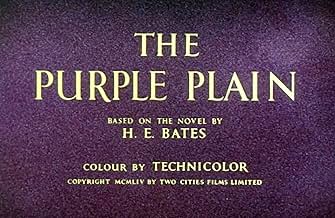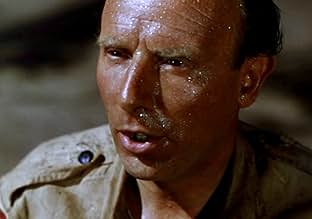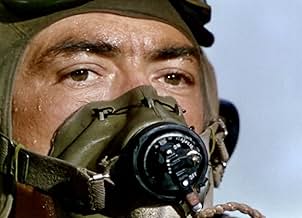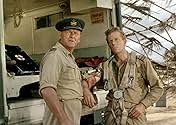VALUTAZIONE IMDb
6,5/10
2640
LA TUA VALUTAZIONE
Aggiungi una trama nella tua linguaIn World War II Burma, a Canadian bomber pilot becomes reckless after losing his bride in a Luftwaffe air raid.In World War II Burma, a Canadian bomber pilot becomes reckless after losing his bride in a Luftwaffe air raid.In World War II Burma, a Canadian bomber pilot becomes reckless after losing his bride in a Luftwaffe air raid.
- Nominato ai 4 BAFTA Award
- 4 candidature totali
Brenda de Banzie
- Miss McNab
- (as Brenda De Banzie)
Dorothy Alison
- Nurse
- (non citato nei titoli originali)
Peter Arne
- Flight Lieutenant
- (non citato nei titoli originali)
Ernest Blyth
- Man Dancing at Wedding
- (non citato nei titoli originali)
Richard Duke
- Nightclub Patron on Dance Floor
- (non citato nei titoli originali)
Jack McNaughton
- Sgt. Ralph Brown
- (non citato nei titoli originali)
Lane Meddick
- Radio Operator
- (non citato nei titoli originali)
Harold Siddons
- Navigator Williams
- (non citato nei titoli originali)
Mya Mya Spencer
- Dorothy
- (non citato nei titoli originali)
Recensioni in evidenza
A really fine film and quite remarkable especially for it's time; shot on location (Ceylon standing in for Burma) in color and with an actual Burmese woman for the female romantic lead. As a war film the pacing and lack of any real 'battle scenes' might disappoint a few people. But the film is at its core is a character study of a RAF pilot (Peck) who has 'gone round the bend' suffering from what we'd call PTSD today and how his battle with it consumes him as much as the war with the Japanese.
The other major character - other that the wonderful Win Min Than as the 'love interest' - is the location itself. 'Location as Charter' is something that David Lean latter became famous for but here in this film the immense expanse of jungle and plain becomes a beautiful but deadly antagonist The 'actual enemy', the Japanese Army, is tellingly, never seen.
As this is a British film all the performances (except for -shockingly- the one Scotswoman in the film) are nicely understated. At one point Peck's character admits that he has been trying to get himself killed in battle ever since the death of his wife to which he drolly adds ' you think that would be pretty easy in a war....but all they kept doing was giving me medals....' WWII airplane geeks ( guilty as charged) will appreciate the shots of the De Haviland Mosquitoes in operation.
The other major character - other that the wonderful Win Min Than as the 'love interest' - is the location itself. 'Location as Charter' is something that David Lean latter became famous for but here in this film the immense expanse of jungle and plain becomes a beautiful but deadly antagonist The 'actual enemy', the Japanese Army, is tellingly, never seen.
As this is a British film all the performances (except for -shockingly- the one Scotswoman in the film) are nicely understated. At one point Peck's character admits that he has been trying to get himself killed in battle ever since the death of his wife to which he drolly adds ' you think that would be pretty easy in a war....but all they kept doing was giving me medals....' WWII airplane geeks ( guilty as charged) will appreciate the shots of the De Haviland Mosquitoes in operation.
Purple Plain is an obscure film in Peck's long list of movie credits. I don't know if this British production got much publicity or release stateside, despite Peck's movie star celebrity. Unfortunately, it's never been a TV regular, which is too bad because this tale of renewal and survival is an unusual and gripping one, in spite of the obscurity.
The film opens in the Burmese jungle during WWII. Peck is a battle fatigued flyer on the ragged edge of breakdown. He's about to be relieved because of erratic behavior, all the while he's flashing back on his wife's death in a London air-raid. These are well-done scenes causing us to sympathize with his loss. Nonetheless, he's jeopardizing his comrades with reckless manuevers because the loss has undermined his will-to-live. Thus, we're torn between sympathy and concern, just like the flight station doctor (Bernard Lee).
In an interesting move, Lee overcomes Peck's agonies by reconnecting him socially, in this case with a nearby missionary community. There Peck finds the vital human relationships so importantly missing from his death-dealing combat duties. As a result, his life takes on new meaning and purpose as a result of rejoining a human community where such life-giving affirmations can emerge. On the whole these are well-done scenes, especially the chaos from the Japanese air attack. In the midst of the carnage, Peck's combat flyer finds a new role in helping to bandage up survivors. Herein lies the movie's basic message and it's an important and humane one, conveyed in fairly subtle fashion, though the turn-around occurs more quickly than I would have liked.
Nonetheless, it's interesting that the script avoids the usual officially sanctioned head-doctor therapies. Note that Peck is not sent to be counseled by an air force psychiatrist, nor to join a chest-baring therapy group, nor to have his past puzzled together Freudian style. Of course, the happy solution here remains a "movie" solution where-- as we all know-- anything can be made to magically happen. Still, for a war-movie setting, the simple affirmation that mental health lies through nurturing social relations and not through government sanctioned killing remains no less suggestive because of its movie origins.
The remainder of the film amounts to a survival trek through the wilds of southeast Asia. It's a well-filmed and harrowing struggle against a forbidding landscape where the crash survivors must decide between staying put or hiking out against great odds. But most importantly, it's Peck's chance to regain his humanity by facing up to the odds, not just for his own survival, but for his two comrades as well. The movie's final scene could not have been better conceived. Indeed, no words are necessary. On the whole, this is a subtly and well thought out anti-war film, no less effective because it concerns the fate of one man rather than thousands.Too bad that its humane message remains so generally unseen.
The film opens in the Burmese jungle during WWII. Peck is a battle fatigued flyer on the ragged edge of breakdown. He's about to be relieved because of erratic behavior, all the while he's flashing back on his wife's death in a London air-raid. These are well-done scenes causing us to sympathize with his loss. Nonetheless, he's jeopardizing his comrades with reckless manuevers because the loss has undermined his will-to-live. Thus, we're torn between sympathy and concern, just like the flight station doctor (Bernard Lee).
In an interesting move, Lee overcomes Peck's agonies by reconnecting him socially, in this case with a nearby missionary community. There Peck finds the vital human relationships so importantly missing from his death-dealing combat duties. As a result, his life takes on new meaning and purpose as a result of rejoining a human community where such life-giving affirmations can emerge. On the whole these are well-done scenes, especially the chaos from the Japanese air attack. In the midst of the carnage, Peck's combat flyer finds a new role in helping to bandage up survivors. Herein lies the movie's basic message and it's an important and humane one, conveyed in fairly subtle fashion, though the turn-around occurs more quickly than I would have liked.
Nonetheless, it's interesting that the script avoids the usual officially sanctioned head-doctor therapies. Note that Peck is not sent to be counseled by an air force psychiatrist, nor to join a chest-baring therapy group, nor to have his past puzzled together Freudian style. Of course, the happy solution here remains a "movie" solution where-- as we all know-- anything can be made to magically happen. Still, for a war-movie setting, the simple affirmation that mental health lies through nurturing social relations and not through government sanctioned killing remains no less suggestive because of its movie origins.
The remainder of the film amounts to a survival trek through the wilds of southeast Asia. It's a well-filmed and harrowing struggle against a forbidding landscape where the crash survivors must decide between staying put or hiking out against great odds. But most importantly, it's Peck's chance to regain his humanity by facing up to the odds, not just for his own survival, but for his two comrades as well. The movie's final scene could not have been better conceived. Indeed, no words are necessary. On the whole, this is a subtly and well thought out anti-war film, no less effective because it concerns the fate of one man rather than thousands.Too bad that its humane message remains so generally unseen.
This is a Rank Company (British) medium budget production of a post war H. E. Bates novel. Well directed by Robert Parrish, the screen writing by Eric Ambler is quite good. It was shot on site in, what was then, Ceylon. (Same location as "Bridge on the River Kwai")
The young Gregory Peck plays Bill Forrester a Canadian pilot in the RAF serving in far off Burma in the closing months of WWII. He flies a two seat Mosquito fighter-bomber. (The actual aircraft was provided through the cooperation of the RAF and repainted in accurate camouflage and markings, for once.) Forrester, it seems, has gone "round the bend" after losing his new wife in the Blitz. He's self destructive, wanting to end it all in combat. "You'd think that would be easy in a war", he explains to Anna, "but I just kept getting medals instead." Anna is a small, slim, pretty teacher, played very well by Win Min Than, a Burmese actress (how refreshing). They, of course, fall in love (It's a MOVIE, folks) and his life really seems to be turning around. But, on a routine flight, he and two others go down in a very remote desert area of Burma's central plain (hence, the title). From there on we have a rather good, believable survival saga.
The English love eccentric characters and this story has several, all well depicted by some of those fine performers who bounce back and forth between the British "legitimate" stage and cinema. Watch for Brenda De Banzie, who plays Miss McNab, an elderly missionary. (Ya couldn't miss her!)
The Purple Plain is a good movie, a fine movie really. Not too heavy, it's historically accurate with good production values. Forrester's growth curve coming out of his personal hell is quite interesting. I found the depiction of the native Burmese was respectful without being condescending. For instance, the love between Bill and Anna is portrayed in a very reserved manner, as it would be between a Westerner and a Christian Asian woman in real life. All in all, the story line and performances are very believable and very enjoyable. I highly recommended The Purple Plain, if YOU can find it.
The young Gregory Peck plays Bill Forrester a Canadian pilot in the RAF serving in far off Burma in the closing months of WWII. He flies a two seat Mosquito fighter-bomber. (The actual aircraft was provided through the cooperation of the RAF and repainted in accurate camouflage and markings, for once.) Forrester, it seems, has gone "round the bend" after losing his new wife in the Blitz. He's self destructive, wanting to end it all in combat. "You'd think that would be easy in a war", he explains to Anna, "but I just kept getting medals instead." Anna is a small, slim, pretty teacher, played very well by Win Min Than, a Burmese actress (how refreshing). They, of course, fall in love (It's a MOVIE, folks) and his life really seems to be turning around. But, on a routine flight, he and two others go down in a very remote desert area of Burma's central plain (hence, the title). From there on we have a rather good, believable survival saga.
The English love eccentric characters and this story has several, all well depicted by some of those fine performers who bounce back and forth between the British "legitimate" stage and cinema. Watch for Brenda De Banzie, who plays Miss McNab, an elderly missionary. (Ya couldn't miss her!)
The Purple Plain is a good movie, a fine movie really. Not too heavy, it's historically accurate with good production values. Forrester's growth curve coming out of his personal hell is quite interesting. I found the depiction of the native Burmese was respectful without being condescending. For instance, the love between Bill and Anna is portrayed in a very reserved manner, as it would be between a Westerner and a Christian Asian woman in real life. All in all, the story line and performances are very believable and very enjoyable. I highly recommended The Purple Plain, if YOU can find it.
A pot-boiler of a Film that is intelligently crafted by Director Robert Parrish. To some it may seem intolerably slow & lacking pace, but to others like myself the Film does something that nearly all Films in the Fifties and indeed many now do not even attempt to achieve, and that is take the time to investigate the main characters in depth and in detail. This is done not via long tracts of dialogue, but via the un-said. In particular Peck and the astonishingly beautiful and talented Win Man Than as 'Anna' develop their relationship in the Film in the subtlest and most delicate of manners. I can find no further information on Win Man Tan, but her performance in this period piece, is one part enchanting, one part mesmerising. We understand fully how Peck's psychiatric problems eventually dissolve as hie begins to find perspective courtesy of love for 'Anna'. This Film is not staggering nor the best piece of Cinema you will ever see, but it is superbly acted, wonderfully cast, sparingly written, adroitly directed, and deserves to be watched by anyone who has a love of Cinema. Recommended, because what we see at our Cinemas today has MUCH to learn from Movie making such as this.
10ekeby
I've had this movie on my 10 Best List for many, many years.
This story of healing from loss through love is immensely powerful. It's exquisitely photographed; it looks much more art film than Hollywood. The direction is solid, and the pacing near perfect. Peck holds his own among a field of scene-stealing character actors. His performance gives us a clue as to what he was like on the stage. His good looks don't distract you; he's utterly convincing as a pilot who's lost the love of his life and no longer cares whether he lives or dies. In the first part of the movie his character is not a good guy, and it's believable. Hard to do when you look like Gregory Peck.
Love conquers all, of course. The story turns on his love for a woman. But, as the movie progresses, we find that he loves his crew too, even "old Blore." The young navigator worships him, and the admiration is returned full force. Their relationship is a key element of the story, as important as the romance between Peck and the Burmese girl.
This is one of those rare movies where men openly love each other--not in a gay sense--in a human sense. It's a love based on respect. This is something missing from almost all heterosexual movies. Probably because most men don't seem to be able to easily distinguish between sex, attraction, affection, and love. It all gets mixed up together, and homophobia damps down any positive emotions between men that isn't associated with some sport. Wartime seems to provoke these feelings too, evidently, but it's rare for a picture to show manly affection, except as a joke. It's just one aspect of this film, but one that shouldn't be overlooked.
I can only hope this movie gets rediscovered and recognized for the fine, fine film that it is.
This story of healing from loss through love is immensely powerful. It's exquisitely photographed; it looks much more art film than Hollywood. The direction is solid, and the pacing near perfect. Peck holds his own among a field of scene-stealing character actors. His performance gives us a clue as to what he was like on the stage. His good looks don't distract you; he's utterly convincing as a pilot who's lost the love of his life and no longer cares whether he lives or dies. In the first part of the movie his character is not a good guy, and it's believable. Hard to do when you look like Gregory Peck.
Love conquers all, of course. The story turns on his love for a woman. But, as the movie progresses, we find that he loves his crew too, even "old Blore." The young navigator worships him, and the admiration is returned full force. Their relationship is a key element of the story, as important as the romance between Peck and the Burmese girl.
This is one of those rare movies where men openly love each other--not in a gay sense--in a human sense. It's a love based on respect. This is something missing from almost all heterosexual movies. Probably because most men don't seem to be able to easily distinguish between sex, attraction, affection, and love. It all gets mixed up together, and homophobia damps down any positive emotions between men that isn't associated with some sport. Wartime seems to provoke these feelings too, evidently, but it's rare for a picture to show manly affection, except as a joke. It's just one aspect of this film, but one that shouldn't be overlooked.
I can only hope this movie gets rediscovered and recognized for the fine, fine film that it is.
Lo sapevi?
- QuizWin Min Than's husband was so jealous about losing her to the film's "decadent" Hollywood star Gregory Peck, he ordered his wife to eat garlic before romantic scenes with Peck. Fortunately, the production crew was able to convince her husband that Peck and the others were respectful of her so he went home leaving her to finish the picture in peace.
- BlooperWhen Peck's co-pilot looks out at the starboard engine, it is leaking some kind of fluid, but that fluid is running down the side of the engine. It's not showing any sign of what would have to be, at least a 200 mph wind, passing over the nacelle.
- Citazioni
Anna: It's not good to die inside.
Squadron Leader Bill Forrester: It's like living a bad dream.
Anna: Here we bury the dead in the earth not in our hearts. Is the dream over now?
Squadron Leader Bill Forrester: I think so.
- Curiosità sui creditiOpening credits prologue: BURMA 1945
- ConnessioniReferenced in Toon in with Me: On This Day... June 25th (2024)
I più visti
Accedi per valutare e creare un elenco di titoli salvati per ottenere consigli personalizzati
- How long is The Purple Plain?Powered by Alexa
Dettagli
Botteghino
- Budget
- 2.000.000 USD (previsto)
- Tempo di esecuzione
- 1h 37min(97 min)
- Colore
- Proporzioni
- 1.66 : 1
Contribuisci a questa pagina
Suggerisci una modifica o aggiungi i contenuti mancanti


















